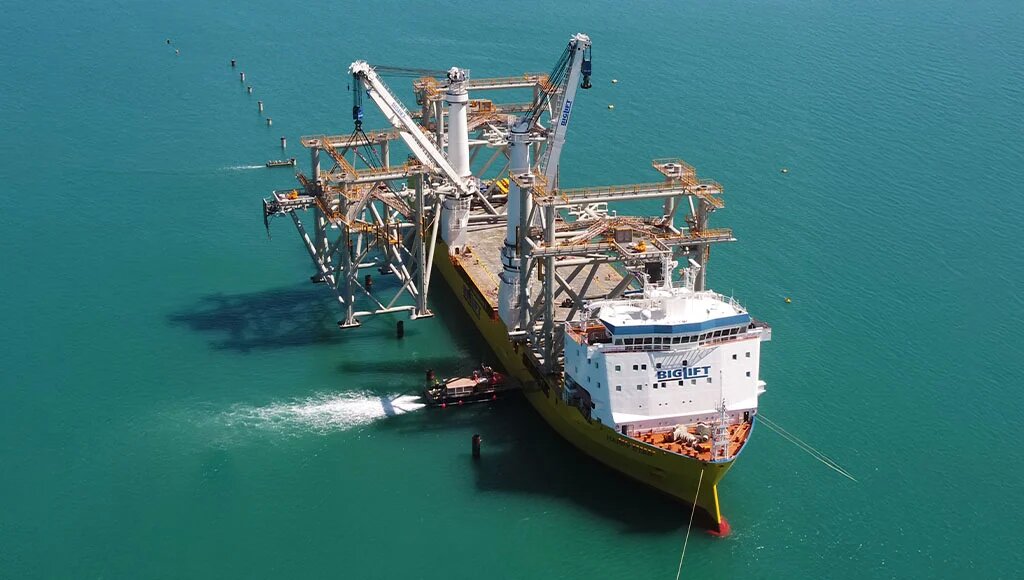Purpose-built as a technology demonstrator for liquefied CO2transportation on the Japanese coast, the 72mExcoolwas formally handed over by Mitsubishi Shipbuilding on 28 November.
Chartered by Nippon Gas Line from contractual shipowner Sanyu Kisen of Kobe, the gas tanker will serve as a test ship for a series of research projects conducted under the auspices of the Japanese New Energy & Industrial Technology Development Organization (NEDO).
Excool: a scalable proving platform for CO2 logistics.
Carbon capture, utilisation and storage (CCUS) is regarded by its proponents as an effective solution towards the attainment of carbon neutrality.
The 996gt Excool will be deployed in an extensive test campaign embracing three national initiatives, namely the CCUS R&D and Demonstration Related Project, the Large-scale CCUS Demonstration in Tomakomai, and the Demonstration Project in CO2 Transportation.
The systems and arrangements encompassed by the small tanker are intended to be scalable to much larger vessels, which Mitsubishi is keen to build.
Vessel construction was effected at the Enoura works of Mitsubishi Shipbuilding at Shimonoseki, on the Kanmon Strait, a yard more widely associated with the production of Japanese long-haul coastal ro-pax ferries.
Primary power is delivered by a six-cylinder, four-stroke engine of the AX33B type designed and manufactured by Akasaka Diesels. Typical of a class of machinery found throughout shipping engaged in Japanese and eastern Asian coastal and intra-regional trades, the 330mm-bore unit yields 1,471kW at 280rpm. The Akasaka range is produced at two factories in Yaizu city, Shizuoka prefecture.
Partner companies in the demonstration programme include Kawakasi Kisen Kaisha (K Line), which has carried out a risk assessment study and which will continue to contribute to the establishment of safe liquefied CO2 tanker operation technology through analysis of in-service data.
Ochanomizu University, moreover, has been commissioned by the Engineering Advancement Association of Japan (ENAA), one of the consignees for the NEDO demonstration projects, to conduct basic research into the ship’s LCO2 pressure control and stability. Utilising its expertise in coastwise gas transportation, Nippon Gas Line will collect and analyse CO2 temperature, pressure, flow and other data from the Excool.
By undertaking the newbuild contract, parent Mitsubishi Heavy Industries has given fresh expression to its strategy of focusing on high value-added work and business opportunities presented by emerging, technically demanding spheres. In handling the entire design and construction of the Excool, including the cargo containment system, the group drew on its expertise in advanced gas handling technology crafted through the prolific output of LNG and LPG carriers over many decades, mainly from its Nagasaki facilities.
Mitsubishi Shipbuilding has already prepared a design of large-scale /CO2 tanker in conjunction with NYK Line, for which ClassNK approval in principal was forthcoming last year. Furthermore, the builder subsequently launched a joint study with Nihon Shipyard for the development of a deep-sea carrier specifically for LCO2 transportation.
MAIN PARTICULARS
Excool
Length overall72.0m
| Length bp | 66.5m |
| Breadth | 12.5m |
| Depth | 5.5m |
| Draught, summer | 4.6m |
| Gross tonnage | 996t |
| Deadweight | 1,262t |
| Cargo capacity | 1,462m3 |
| Design, max.pressure | 1.90MPa |
| Design, min.temperature | minus 50degC |
| Main engine power | 1,471kW |
| Generators | 3 = 900kW |
| Class | ClassNK |
| Class notations | NS*, LGC 2PG, PSPC-WBT, MNS*, Restricted service in Japan |
| /registry | /Kobe |





